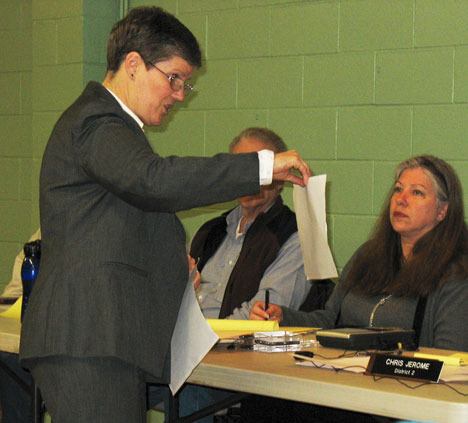CLINTON — The Port of South Whidbey is looking into entering negotiations with AT&T to build a cell tower on a ridge above Possession Point Waterfront Park.
Neighbors, however, want the port to just say no.
“You need to keep this forever for recreation,” Leslie Tidball told port officials Monday.
She said she represents about 23 local residents who live near the port’s property.
“We don’t think this tower is in the right place. Once you say yes to AT&T, the Dorothy Cleveland Trail and park will be gone,” Tidball said.
Port commissioners and Steven Berke, a site-acquisition specialist for Goodman Networks, took great pains to assure the 40 people present that no lease has been signed.
“This is in the proposal stage,” Berke noted. “This area does not have the coverage or signal strength that AT&T wants for their customers.”
He said the phone company would offer other carriers — including Verizon and T-Mobile — use of the tower in the future.
Berke said that construction of the tower will provide increased coverage throughout South Whidbey and improve wireless and emergency 911 phone reception, as well as high-speed broadband Internet service.
The lease area would be approximately 40 feet by 40 feet, surrounded by a cedar fence located roughly 35 feet from the trail. The 140-foot-high cell tower would be painted to match the existing tree color, and only the top 20 percent of the tower would be seen above the tree line. Berke said the project would blend into the landscape.
“The county allows a tower to be 40 feet higher than the tree line, which is 110 feet,” Berke said. “The tower’s emissions will be well below the standards set by the FCC [Federal Communications Commission].
“It’s my opinion that the tower will not be highly visible, and will have little or no affect on real estate values,” he said. “In fact, having the latest wireless technology could be viewed as an attraction to people moving to South Whidbey.”
Not everyone in the audience opposed the idea.
Fire District 3 Deputy Chief Jon Beck said the district has a vested interest in supporting the tower.
“This gives us the chance to improve communications with you regarding public safety,” he said. “Building towers like this are cost-prohibitive for emergency responders, but upgrading won’t cost taxpayers a cent.”
One resident took issue with those attending.
“Your neighbors don’t all support you,” Karl Seeman told Tidball. “I want the port to approve this tower. When I have an emergency, I want to be able to get someone if I need help.”
Another homeowner also took the port’s view. Darryl Posch said he’d like to meet any of his neighbors who built their house without cutting down any trees.
“When the park first built the trail, I put up ‘No trespassing’ signs that are regularly torn down, not by hikers, but by neighbors,” he said.
Local residents, however, are concerned about protecting the scenic beauty of the forest and water views of the area along the low-impact trail, which is popular with many island residents and visitors. They are worried too many trees will be lost if the tower is built.
And they have a powerful argument.
“We believe that future recreational use of the park was intended by the initial estate bequest of the land involved in 1985 and subsequent acquisition by the Port of South Whidbey,” Tidball said.
“We request that the port commissioners take another look at this proposal and respectfully decline the AT&T offer to develop this candidate site.”
Whidbey Environmental Action Network president Steve Erickson said he had contacted state officials for their opinion.
“Because a cell tower within the park would detract from the user’s park experience, its presence would be inconsistent with the terms of the original grant for purchase of the land,” Erickson told port commissioners. “Leasing land for the purpose of erecting a cell tower and associated infrastructure would violate the terms of that grant.”
He added that under state law, the port would then be obligated to replace the land where the user experience is degraded with land equivalent in both fair market value and utility for the same recreation purposes.
Berke said a power and a phone line would be provided along a 12-foot-wide access road running about 600 feet from Lupine Lane, where most of the neighbors’ homes are located. An emergency generator would kick in only if the power failed. He added that details of the lease — and how much the port would be paid — wasn’t determined yet.
“We don’t want to spend too much until we get the go-ahead,” he noted.
After everyone had a chance to speak, Port Commissioner Curt Gordon agreed there might be a problem at the state level and Port Commissioner Chris Jerome concurred.
“We won’t violate any RCO encumbrances,” he said, referring to the state’s Recreation and Conservation Office which oversees recreation issues.
Commissioners then voted to study the issues raised at the meeting, including any legal strings on the use of the property.
The next regular port meeting is scheduled at 7:30 p.m. Tuesday, April 13 at 5475 Maxwelton Road in Langley.



